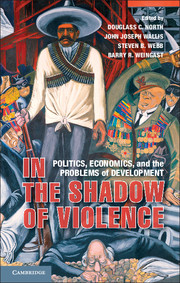53 results
3 - Adam Smith’s “Industrial Organization” of Religion
-
-
- Book:
- Interpreting Adam Smith
- Published online:
- 14 September 2023
- Print publication:
- 28 September 2023, pp 39-61
-
- Chapter
- Export citation
Law without the State: Legal Attributes and the Coordination of Decentralized Collective Punishment
-
- Journal:
- Journal of Law and Courts / Volume 1 / Issue 1 / Spring 2013
- Published online by Cambridge University Press:
- 21 October 2022, pp. 3-34
-
- Article
- Export citation
11 - Analytic Narratives and Case Studies
- from Part III - Putting Case Studies to Work: Applications to Development Practice
-
-
- Book:
- The Case for Case Studies
- Published online:
- 05 May 2022
- Print publication:
- 26 May 2022, pp 239-257
-
- Chapter
-
- You have access
- Open access
- HTML
- Export citation
13 - A Positive Theory of the Rule of Law
- from Part III - Moralities
-
-
- Book:
- The Cambridge Companion to the Rule of Law
- Published online:
- 03 August 2021
- Print publication:
- 12 August 2021, pp 237-258
-
- Chapter
- Export citation
Douglass North’s Theory of Politics
-
- Journal:
- PS: Political Science & Politics / Volume 52 / Issue 2 / April 2019
- Published online by Cambridge University Press:
- 04 January 2019, pp. 213-217
- Print publication:
- April 2019
-
- Article
- Export citation
5 - Rethinking Mass and Elite: Decision-Making in the Athenian Law-Courts
-
-
- Book:
- Ancient Greek History and Contemporary Social Science
- Published by:
- Edinburgh University Press
- Published online:
- 06 May 2021
- Print publication:
- 06 June 2018, pp 157-183
-
- Chapter
- Export citation
A Discussion of Josiah Ober’s The Rise and Fall of Classical Greece
-
- Journal:
- Perspectives on Politics / Volume 14 / Issue 4 / December 2016
- Published online by Cambridge University Press:
- 28 December 2016, p. 1146
- Print publication:
- December 2016
-
- Article
- Export citation
7 - Constitutions as Coordinating Devices
-
-
- Book:
- Institutions, Property Rights, and Economic Growth
- Published online:
- 05 April 2014
- Print publication:
- 17 April 2014, pp 121-150
-
- Chapter
- Export citation
Contributors
-
-
- Book:
- Institutions, Property Rights, and Economic Growth
- Published online:
- 05 April 2014
- Print publication:
- 17 April 2014, pp vii-viii
-
- Chapter
- Export citation
Contents
-
- Book:
- In the Shadow of Violence
- Published online:
- 05 December 2012
- Print publication:
- 12 November 2012, pp v-vi
-
- Chapter
- Export citation
Frontmatter
-
- Book:
- In the Shadow of Violence
- Published online:
- 05 December 2012
- Print publication:
- 12 November 2012, pp i-iv
-
- Chapter
- Export citation
Contributors
-
- Book:
- In the Shadow of Violence
- Published online:
- 05 December 2012
- Print publication:
- 12 November 2012, pp vii-viii
-
- Chapter
- Export citation
One - Limited Access Orders
-
-
- Book:
- In the Shadow of Violence
- Published online:
- 05 December 2012
- Print publication:
- 12 November 2012, pp 1-23
-
- Chapter
- Export citation
Ten - Lessons
-
-
- Book:
- In the Shadow of Violence
- Published online:
- 05 December 2012
- Print publication:
- 12 November 2012, pp 328-350
-
- Chapter
- Export citation

In the Shadow of Violence
- Politics, Economics, and the Problems of Development
-
- Published online:
- 05 December 2012
- Print publication:
- 12 November 2012
Index
-
- Book:
- In the Shadow of Violence
- Published online:
- 05 December 2012
- Print publication:
- 12 November 2012, pp 351-366
-
- Chapter
- Export citation
Acknowledgments
-
- Book:
- In the Shadow of Violence
- Published online:
- 05 December 2012
- Print publication:
- 12 November 2012, pp ix-x
-
- Chapter
- Export citation
4 - Democratization and Countermajoritarian Institutions Power and Constitutional Design in Self-Enforcing Democracy
- from Part II - How Do We Get to Constitutional Design? Constraints and Conditions
-
-
- Book:
- Comparative Constitutional Design
- Published online:
- 05 March 2012
- Print publication:
- 27 February 2012, pp 69-100
-
- Chapter
- Export citation
Contributors
-
-
- Book:
- Comparative Constitutional Design
- Published online:
- 05 March 2012
- Print publication:
- 27 February 2012, pp ix-x
-
- Chapter
- Export citation
8 - A Theory of the Politically Independent Judiciary
-
-
- Book:
- Courts in Latin America
- Published online:
- 01 June 2011
- Print publication:
- 17 January 2011, pp 219-247
-
- Chapter
- Export citation



